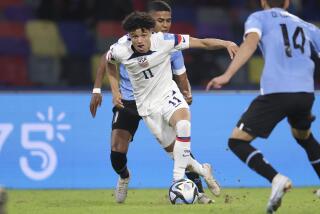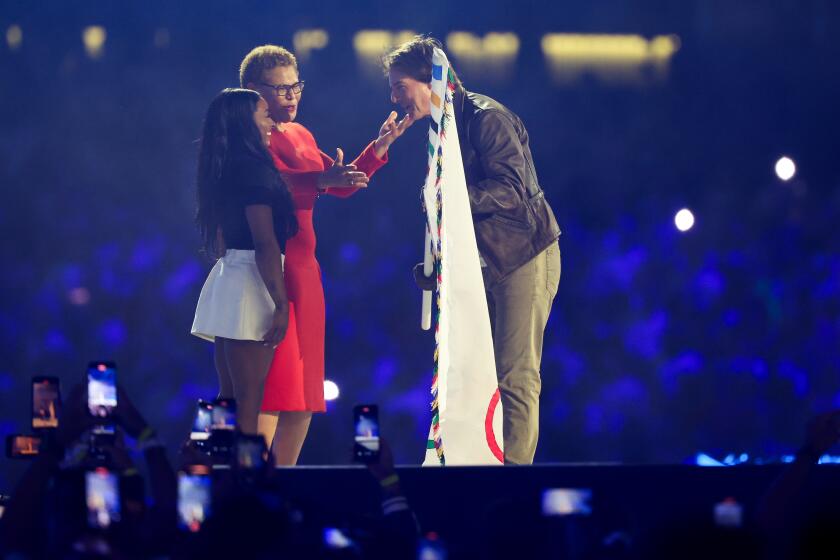State of the Reunion
Mike Eruzione hadn’t seen so many flags in 22 years. He hadn’t spotted so many stars, noticed so many stripes, since he’d scored the goal that enabled a band of anonymous American amateurs to defeat the mighty Soviet hockey team on the way to winning the 1980 Olympic gold medal.
He was driving from Chicago to his home in Boston, because the events of Sept. 11 had made flying impossible. He saw the flags and the red, white and blue banners hanging from buildings, bridges and freeway overpasses, and shook his head, again and again.
“It’s kind of frustrating,” Eruzione says. “Why don’t we do this all the time?
“Why does it take a great victory or a great tragedy to show our love or our support for our country?”
The flags came out in 1980 after Eruzione and his teammates, playing the role of no-hope hosts at the Lake Placid Winter Olympics, had scored one of the most famous upsets in sports history, defeating the five-time Olympic champion Soviet Union, 4-3, in the semifinals en route to a stunning gold-medal triumph over Finland.
“Miracle on Ice,” it was called. The reference, of course, was to the utter improbability of victory, but it also could apply to the cathartic effect one hockey result could have on the mood of a country.
Before the 1980 Winter Olympics, the United States found itself in a strange place--locked in a stalemate over the fate of 52 American hostages held captive in Iran, nervous about the Soviet Union’s recent invasion of Afghanistan, dispirited by a stagnant economy, soaring inflation and a gasoline shortage.
“People were feeling beaten down at that time,” says Ken Morrow, a defenseman for the 1980 U.S. hockey team.
Says Jim Craig, the team’s starting goaltender, “America was questioning if it was still the biggest superpower. I think there was some real doubt about it.”
Craig remembers watching the evening news then.
“You looked at President Jimmy Carter’s face and he looked scared,” he says. “Nobody knew what was going to happen.”
Twenty-two years later, Craig says he sees some similarities in the current landscape. Another war in Afghanistan. The U.S. economy sagging again. A melancholy mood across the country.
“After Sept. 11, people have felt the same way,” he says. “It’s so emotional right now.”
Dave Silk, a winger on the 1980 U.S. hockey team, says, “It’s not hard to draw parallels between what’s happening in Afghanistan and [with Osama] bin Laden now and what was happening in Afghanistan with the Soviets then. There was a common enemy that the country, both then and now, felt was being unjust to the USA, which banded the country together.
“I think that also, both then and now, there was somewhat of an emotional hangover in terms of how the country feels about itself. Back then, obviously, there were gas prices and inflation and hostages in Iran and the Soviets invading Afghanistan, the whole litany of problems. And now we have Sept. 11 and the things going on that we’re facing now.
“I think in both cases, the country could be helped by having a shot in the arm somehow. Something to boost the collective spirit, I would say.”
In 1980, the country found it in a group of mostly college hockey players who were given no chance to beat the Soviet Union, and yet found a way. Twenty-two years later, as the United States prepares to host another Winter Olympics in Salt Lake City, there is considerable drafting off the 1980 hockey team.
Today, the 1980 gold medalists will reassemble in Los Angeles for a reunion game against a group of recently retired NHL players. .The game, one of several activities held in association with Saturday’s NHL All-Star game at Staples Center, will be played on NHL FANtasy’s Center Ice Rink at the Los Angeles Convention Center at 3 p.m.
“There are very few positive events where you remember exactly where you were when they happened,” says Rob Apatoff, senior vice president for Allstate Insurance, which is sponsoring the reunion game. “There are mostly negative events--the John F. Kennedy assassination, the attack on the World Trade towers. This is one of the few positive events where people know exactly where they were when the ’80 team won the gold ....
“I think that was truly a start of a renewed sense of patriotism and people coming back together. I think that’s why this has struck such a chord with people, when they found out the team’s getting back together. It brings them back to a point in time when they felt really good.”
Eruzione, who retired from hockey immediately after the 1980 Olympics, has extended the moment into a profitable career as a motivational speaker. His bookings include company retreats and corporate conventions.
“The people who are making decisions for corporations today were at an age in 1980 where they were probably in college or just starting in their business,” he says. “Eventually, they became CEOs. And they think, ‘What person or group could we bring in to talk about teamwork and togetherness and commitment and overcoming odds?’ And they say, ‘Well, I remember when I was in college watching that hockey team. Let’s get one of those guys.’”
He also is a popular interview subject whenever a major sporting event features one team or participant that is heavily favored over another, such as Sunday’s Super Bowl game between the St. Louis Rams and New England Patriots. With the Patriots 14-point underdogs, Eruzione figures he’ll get “two or three” phone calls from reporters this week.
“They ask, ‘What advice do you have for them?’” Eruzione says. “I don’t have any advice. Or they’ll ask, ‘Do they have a chance?’”’
And what does he tell them?
“Yeah!” he says with a laugh. “If you get to the Super Bowl, guess what, you can win. And if you don’t think you can win, you don’t belong in the damn game in the first place. That’s what I tell people: Why can’t they win? These guys are players; they’re talented.
“There has not been a sporting event, since 1980, where the odds were bigger than the odds against us. The oddsmakers, the experts, they pick what the numbers supposedly are going to be. Nobody was a greater underdog than we were. And we won. So that’s what I tell them. ‘Guess what. Anything can happen.’”
Except, in all likelihood, another team replicating the Miracle on Ice.
“Not in the sport of hockey,” Craig says. “Not in the Olympics.”
For one thing, the Olympic hockey tournament has turned pro. Amateurs have been pushed aside for the current collection of regionalized NHL all-star teams--the professionals from Canada against the professionals from Finland, from Sweden, from the United States.
For another, the Cold War is long past. The Soviet Union has been dismantled.
“The way the Russians have split up, there’s like six teams they’re putting out now,” Craig says. “The best players are split up all over the place. Back then, it was one big team.”
Eruzione says, “If there was an amateur hockey team that went to the Olympic Games in Salt Lake City and won a gold medal, it would be pretty special. But again, the Soviets are not our enemies anymore. So there’s not the Cold War aspect of the games as there was in 1980.
“If the Taliban had a soccer team and played our men’s team and we were super underdogs and we won, boy, that would create some kind of a nationalistic pride. But there’s no enemy out there in ice hockey today.”
Thirteen of the 20 players on the 1980 Olympic team went on to play in the NHL. Morrow won four Stanley Cup championships with the New York Islanders. Center Neal Broten scored more than 900 points in the NHL. All long retired now, they have settled into middle age, with careers in real estate, the stock market, banking and teaching. Only three are still involved in hockey--Morrow as the director of pro scouting for the Islanders, defenseman Mike Ramsey as an assistant coach with the Minnesota Wild and winger John Harrington as the hockey coach at St. John’s University in Minnesota.
Consequently, today’s reunion game represents something of a physical and emotional challenge.
“I’d be surprised if more than three or four guys played regularly,” says Silk, who works for Putnam Investments and teaches management classes at his alma mater, Boston University. “There might be a couple guys that play in some sort of pickup hour.”
Silk is not one, however.
“I’ve been carbo-loading since about 1993,” he jokes. “So I think I’ve got that covered. And I’ll probably take a walk around the block with my dog or my wife and that’ll be the extent of my training.”
Silk has participated in similar reunion games over the years, usually against teams of celebrities or NHL alumni. It’s a good time to be had with old friends, he says, so long as you don’t pay close attention to the scoreboard.
“We usually get killed,” he says, laughing.
“One time we were playing in Philadelphia and they were beating us about five-nothing after about 10 minutes of the game. And one of the guys on the other team’s bench said, ‘Boy, now I know why they called it Miracle on Ice.’”
*
Staff writer David Wharton contributed to this report.
More to Read
Go beyond the scoreboard
Get the latest on L.A.'s teams in the daily Sports Report newsletter.
You may occasionally receive promotional content from the Los Angeles Times.








